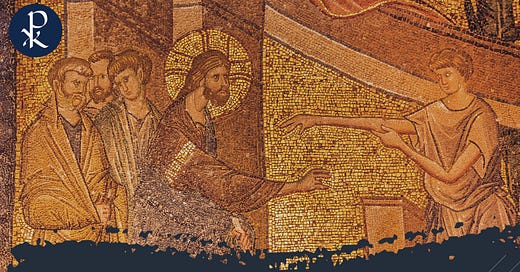Are you looking for a way to navigate this election year without compromising your conscience?
Are you looking for resources for your Catholic parish or community that represent the breadth of the Church’s social teaching without partisan bias?
Check out my Life as Christ: Catholic Social Teaching Retreat.
The Church’s social doctrine is a part of our moral teaching that goes back to the Old Testament where God repeatedly commands his people to treat “quartet of the vulnerable”—the widow, the orphan, the poor, the foreigner—with preferential justice and mercy.
Jesus doubled down on this social morality and taught that failure to care of the vulnerable won’t just lead to earthly consequences, but eternal ones as well. “The glorious Christ will judge by the love of neighbor that consists in ministering to the hungry, the thirsty, the stranger, the naked, the sick, and the imprisoned, with whom he identifies. For Jesus, the good done to every human being, regardless of the ties of blood or religion, is the single criterion of judgment” (Dignitas Infinita 12).
Jesus proclaimed an upside-down Kingdom. There was an idea present in Jesus’s time (and present today as well), that if you suffer you must have sinned. Likewise, if you have wealth and power then that’s a sign of God’s blessing. But Jesus said that the poor and powerless are blessed and the rich and powerful are viewed with suspicion.
This upside down Kingdom, grounded on the infinite dignity of every person, has been proposed by the Church throughout the centuries. In 1891, Pope Leo XIII formally compiled these social and economic commands into his encyclical, Rerum Novarum, to address the oppression of laborers and the rise of new ideologies in the modern industrial society.
All of the popes since have discerned the social concerns of their day and contributed to this body of Catholic Social Teaching:
“The Church's social teaching comprises a body of doctrine, which is articulated as the Church interprets events in the course of history, with the assistance of the Holy Spirit, in the light of the whole of what has been revealed by Jesus Christ. This teaching can be more easily accepted by men of good will, the more the faithful let themselves be guided by it. The Church's social teaching proposes principles for reflection; it provides criteria for judgment; it gives guidelines for action” (CCC 2422-2423).
Catholic Social Teaching challenges every ideology, every political party, and every heart. As the US Bishops have taught, “As citizens, we should be guided more by our moral convictions than by our attachment to a political party or interest group. When necessary, our participation should help transform the party to which we belong; we should not let the party transform us” (Forming Consciences for Faithful Citizenship 14).
Catholic Social Teaching asks us to consider more than the bare minimum, more than simply not sinning. “Our outlook on society has been too much in terms of the confessional, and too little in terms of the City of God. A man could avoid the sin of being theologically drunk every night of his life, and give a very poor impression to his neighbors of the Virtue of Temperance” (The Sun of Justice by Harold Robbins).
Catholic Social Teaching calls for an alternative way of thinking, one that’s been transformed by the Gospel. “Certainly, all this calls for an alternative way of thinking. Without an attempt to enter into that way of thinking, what I am saying here will sound wildly unrealistic. On the other hand, if we accept the great principle that there are rights born of our inalienable human dignity, we can rise to the challenge of envisaging a new humanity. We can aspire to a world that provides land, housing and work for all. This is the true path of peace” (Fratelli Tutti 127).
The Life as Christ: Catholic Social Teaching Retreat is a one-day retreat that will help you trust in God’s goodness and love for you personally and, in light of that, explain the four pillars of Church’s social teaching: Dignity of the Human Person, Common Good, Subsidiarity, Solidarity.
This retreat is for anyone who aches for a renewed encounter with Jesus Christ and who desires to walk “a way of life marked by the flavor of the Gospel” (Fratelli Tutti 1).
Life as Christ is a quiet, powerful day-long retreat. It is divided into five sessions. The first session proclaims God’s goodness and desire for each one of us personally. The rest of the sessions dive into the four pillars of Catholic Social Teaching. In addition to the talks, the retreat includes time for personal prayer, group discussion, and Eucharistic Adoration.
If you would like to bring this retreat to your parish, school, or community, email me at: fahey.paul@gmail.com




